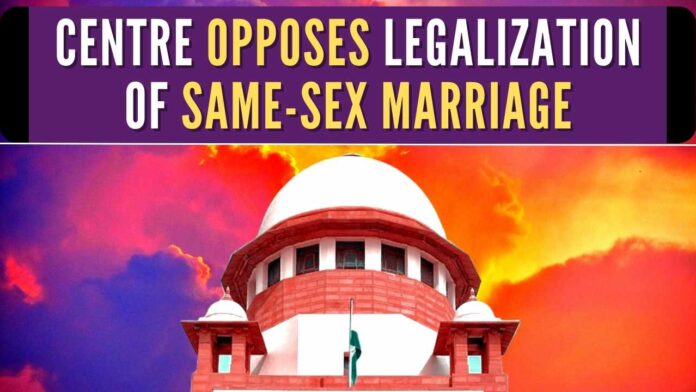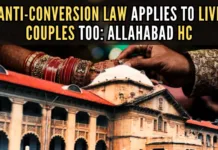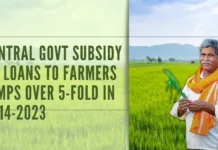
Centre opposes same-sex marriage in an affidavit to SC, cites ‘Indian family concept’
The Central government has opposed in the Supreme Court a batch of pleas seeking legal validation of same-sex marriage, saying it would cause complete havoc with the delicate balance of personal laws and accepted societal values. In an affidavit before the Supreme Court of India which is scheduled to hear the matter on Monday, the government submitted that despite the decriminalization of Section 377 of the Indian Penal Code, the petitioners cannot claim a fundamental right for same-sex marriage to be recognized under the laws of the country.
The Central government was replying to a series of petitions seeking registration of same-sex marriages. At the same time, it submitted that though the Centre limits its recognition to heterosexual relationships, there may be other forms of marriages or unions or personal understandings of relationships between individuals in a society and these “are not unlawful“.
The affidavit by the government said western decisions sans any basis in Indian constitutional law jurisprudence cannot be imported in this context while asserting that granting recognition to human relations is a legislative function and can never be a subject of judicial adjudication. “Marriage, as an institution in law, has many statutory and other consequences under various legislative enactments. Therefore, any formal recognition of such human relationship cannot be regarded as just a privacy issue between two adults,” it said.
The Centre said the institution of marriage between two individuals of the same gender is neither recognized nor accepted in any uncodified personal laws or any codified statutory laws. The government said that at the outset the notion of marriage itself necessarily and inevitably presupposes a union between two persons of the opposite sex and this definition is socially, culturally, and legally ingrained into the very idea and concept of marriage and ought not to be disturbed or diluted by judicial interpretation.
“It must be kept in mind that granting recognition and conferring rights recognizing human relation which has its consequences in law, and privileges, is, in essence, a legislative function and can never be the subject matter of judicial adjudication. The prayer made by the petitioner before this court, is, therefore, wholly unsustainable, untenable, and misplaced,” it said. The Centre said, “It is submitted that despite the decriminalization of Section 377 of the Indian Penal Code, the petitioners cannot claim a fundamental right for same-sex marriage to be recognized under the laws of the country.”
It said that even if such a right is claimed under Article 21 of the Constitution, such right can be curtailed by the competent legislature on permissible constitutional grounds including legitimate state interest. “It is submitted that there cannot be an untrammeled right under Article 21 and cannot override other constitutional principles,” the government said, adding that Parliament has designed and framed marriage laws, which are governed by personal laws/ codified laws relatable to customs of various religious communities, to recognize only the union of a man and a woman to be capable of legal sanction and thereby claim legal and statutory rights and consequences.
“It is submitted that any interference with the same would cause complete havoc with the delicate balance of personal laws in the country and in accepted societal values,” it said. The Centre said that while there may be various other forms of marriages or unions or personal understandings of relationships between individuals in a society, the State limits the recognition to the heterosexual form.
“The State does not recognize these other forms of marriages or unions or personal understandings of relationships between individuals in a society but the same are not unlawful,” it said. The government said that the registration of marriage of same-sex persons also results in violation of existing personal as well as codified law provisions such as “degrees of prohibited relationship”, “conditions of marriage” and “ceremonial and ritual requirements” under personal laws governing the individuals.
It said marriage between a biological man and a biological woman takes place either under personal laws or codified laws namely, the Hindu Marriage Act, of 1955, the Christian Marriage Act, of 1872, the Parsi Marriage and Divorce Act, of 1936, or the Special Marriage Act, 1954 or the Foreign Marriage Act, 1969.
The government said that all these indicate that in India, marriage is a bond between a biological man and a biological woman only and that is the legislative policy of the legislature and the petitioners cannot pray for a mandamus of the court to change the legislative policy. It said this particular human relationship, in its present form, that is between a biological man and a biological woman is accepted statutorily, religiously, and socially and any recognized deviation of this human relationship can occur only before the competent legislature.
It added while a marriage may be between two private individuals having a profound impact on their private lives, it cannot be relegated to merely a concept within the domain of privacy of an individual when the question of formalizing their relationship and the legal consequences flowing therefrom is involved.
PGurus is now on Telegram. Click here to join our channel and stay updated with all the latest news and views
For all the latest updates, download PGurus App.
- NIA confiscates Pak-harboured Khalistani terrorist Lakhbir Singh Rode’s key aide’s land in Moga - April 19, 2024
- Prime Minister Narendra Modi: A Gujju businessman who does not invest his precious time for a losing battle - April 13, 2024
- NIA arrests two accused Shazib and Taahaa in Bengaluru’s Rameshwaram Cafe blast case from Kolkata - April 12, 2024











This case should have been outright rejected by Supreme Court.
Now it will say need to protect interest of LGBTB community & organize a Supreme Court committee to make recommendations to govt.
Other than in exceptional cases a biologically born child is a major factor in keeping the parents to gather and stability, often despite major disagreements which will be missing in the same sex marriages.